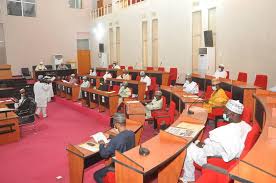Adoption of local language, a good move
The recent adoption by the Bauchi State House of Assembly of Hausa Language, in addition to English, in the conduct of its legislative business is a welcome development that deserves commendation. Speaker of the house, Abubakar Y Suleiman, announced the development at the plenary shortly after the member representing Shira Constituency, Hon. Auwal Hassan, moved […]

The recent adoption by the Bauchi State House of Assembly of Hausa Language, in addition to English, in the conduct of its legislative business is a welcome development that deserves commendation.
Speaker of the house, Abubakar Y Suleiman, announced the development at the plenary shortly after the member representing Shira Constituency, Hon. Auwal Hassan, moved a motion to that effect.
This, as Hassan rightly noted, is in line with Section 97 of the 1999 Constitution of the Federal Republic of Nigeria which states that, “The business of a House of Assembly shall be conducted in English, but the House may, in addition to English, conduct the business of the House in one or more other languages spoken in the state as the House may by resolution approve.”
The speaker also cited Order 3 Rule 8 of the Standing Orders of the Bauchi State House of Assembly 2017 which provides that proceedings and debates of the house shall be conducted in English Language or one or more other languages spoken in the state.
- After 16 years, FAAN, Bi-Courtney move to end MMA2 concession row
- Benue man accused of raping 4-year-old girl
He submitted that Hausa being the most popular spoken language in Bauchi, used for communication purposes by over 90% of people across the state, should be adopted in addition to English as a second official language. This was seconded and adopted by the house.
To be specific, Bauchi State House of Assembly is not the first to adopt a local language for the conduct of its official business. Lagos State House of Assembly, as far back as December 2007, adopted a local language as its official means of communication for its businesses. States such as Oyo and Ogun also conduct their businesses in Yoruba, in addition to English.
The Kaduna State House of Assembly and many of its counterparts across the North also conduct legislative businesses in Hausa.
While appealing for the adoption of Yoruba Language in Osun State House of Assembly, Akanni Omooba, an advocate for the Yoruba language and culture, emphasised the numerous benefits that such a decision would bring.
He said, “By using Yoruba as the language of communication, the parliament would create a more inclusive and accessible environment for all citizens, bridging the gap between the lawmakers and the people they represent. This linguistic transformation would enable a more direct and effective means of communication, resulting in better governance and the active participation of the public in the democratic process.”
Furthermore, he said, “The adoption of Yoruba as the official language by the assembly would enhance civic education and awareness among the people of Osun State. It would foster a sense of pride and cultural unity, reinforcing the connection between the government and its constituents.
“The adoption of Yoruba as the language of communication within the parliamentary proceedings will be a significant step towards cultural preservation, inclusivity, and effective governance. It is a progressive move that will inspire other states in Nigeria to recognise and celebrate their native languages, contributing to the overall growth and development of the nation.”
We, therefore, not only support the adoption of local languages by state assemblies in the conduct of their businesses, but also advocate that state assemblies find a way of translating their proceedings in major languages for the benefit of numerous Nigerians that are not proficient in the English language. When people receive information in their local languages, they stand the chance of understanding it better. In addition to having a sense of belonging, it will also carry more people along to enable them to know more about vital decisions of the lawmakers. This will go a long way in pulling more people into participating in debates and other businesses of the various houses of assembly.
Adopting local languages in the conduct of legislative businesses will not only protect the languages from going into extinction, but also promote them for the benefit of generations unborn. Dr Kehinde Ayoola, a lecturer at the Department of English, Obafemi Awolowo University, Ile-Ife, once said in an open letter to speakers of national and state houses of assembly that, ‘‘Nigerian legislators and public policymakers need to appreciate the fact that indigenous Nigerian languages have beauty and style; power and potency; humour and history; and much more. All these amount to a heritage that should not be sacrificed on the altar of globalisation. Nigerian languages deserve to be given an equal opportunity with English as the language of education, business, government and formal occasions. Achieving Linguistic Human Rights in Nigeria is not expected to be an easy task, but it is worth pursuing because it has far-reaching implications on the soul of the Nigerian nation, and the psyche and identity of its people as global citizens.’’
The Bauchi State House of Assembly, therefore, deserves commendation for bringing this important matter back to national prominence. We call on all those who have adopted local languages to ensure implementation and for others yet to do so to consider it. Nigerian citizens should also support this move and ensure that they get the best out of the governments they put in place to serve them.
